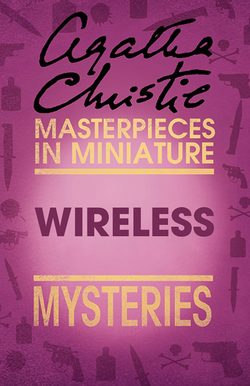Читать книгу Wireless: An Agatha Christie Short Story - Агата Кристи, Agatha Christie, Detection Club The - Страница 5
Wireless
Оглавление‘Wireless’ was first published in the Sunday Chronicle Annual 1925, September 1925.
‘Above all, avoid worry and excitement,’ said Dr Meynell, in the comfortable fashion affected by doctors.
Mrs Harter, as is often the case with people hearing these soothing but meaningless words, seemed more doubtful than relieved.
‘There is a certain cardiac weakness,’ continued the doctor fluently, ‘but nothing to be alarmed about. I can assure you of that.
‘All the same,’ he added, ‘it might be as well to have a lift installed. Eh? What about it?’
Mrs Harter looked worried.
Dr Meynell, on the contrary, looked pleased with himself. The reason he liked attending rich patients rather than poor ones was that he could exercise his active imagination in prescribing for their ailments.
‘Yes, a lift,’ said Dr Meynell, trying to think of something else even more dashing – and failing. ‘Then we shall avoid all undue exertion. Daily exercise on the level on a fine day, but avoid walking up hills. And above all,’ he added happily, ‘plenty of distraction for the mind. Don’t dwell on your health.’
To the old lady’s nephew, Charles Ridgeway, the doctor was slightly more explicit.
‘Do not misunderstand me,’ he said. ‘Your aunt may live for years, probably will. At the same time shock or over-exertion might carry her off like that!’ He snapped his fingers. ‘She must lead a very quiet life. No exertion. No fatigue. But, of course, she must not be allowed to brood. She must be kept cheerful and the mind well distracted.’
‘Distracted,’ said Charles Ridgeway thoughtfully.
Charles was a thoughtful young man. He was also a young man who believed in furthering his own inclinations whenever possible.
That evening he suggested the installation of a wireless set.
Mrs Harter, already seriously upset at the thought of the lift, was disturbed and unwilling. Charles was fluent and persuasive.
‘I do not know that I care for these new-fangled things.’ said Mrs Harter piteously. ‘The waves, you know – the electric waves. They might affect me.’
Charles in a superior and kindly fashion pointed out the futility of this idea.
Mrs Harter, whose knowledge of the subject was of the vaguest, but who was tenacious of her own opinion, remained unconvinced.
‘All that electricity,’ she murmured timorously. ‘You may say what you like, Charles, but some people are affected by electricity. I always have a terrible headache before a thunderstorm. I know that.’
She nodded her head triumphantly.
Charles was a patient young man. He was also persistent.
‘My dear Aunt Mary,’ he said, ‘let me make the thing clear to you.’
He was something of an authority on the subject. He delivered now quite a lecture on the theme; warming to his task, he spoke of bright-emitter valves, of dull-emitter valves, of high frequency and low frequency, of amplification and of condensers.
Mrs Harter, submerged in a sea of words that she did not understand, surrendered.
‘Of course, Charles,’ she murmured, ‘if you really think –’
‘My dear Aunt Mary,’ said Charles enthusiastically. ‘It is the very thing for you, to keep you from moping and all that.’
The lift prescribed by Dr Meynell was installed shortly afterwards and was very nearly the death of Mrs Harter since, like many other old ladies, she had a rooted objection to strange men in the house. She suspected them one and all of having designs on her old silver.
After the lift the wireless set arrived. Mrs Harter was left to contemplate the, to her, repellent object – a large ungainly-looking box, studded with knobs.
It took all Charles’ enthusiasm to reconcile her to it.
Charles was in his element, he turned knobs, discoursing eloquently the while.
Mrs Harter sat in her high-backed chair, patient and polite, with a rooted conviction in her own mind that these new fangled notions were neither more nor less than unmitigated nuisances.
‘Listen, Aunt Mary, we are on to Berlin, isn’t that splendid? Can you hear the fellow?’
‘I can’t hear anything except a good deal of buzzing and clicking,’ said Mrs Harter.
Charles continued to twirl knobs. ‘Brussels,’ he announced with enthusiasm.
‘Is it really?’ said Mrs Harter with no more than a trace of interest.
Charles again turned knobs and an unearthly howl echoed forth into the room.
‘Now we seem to be on to the Dogs’ Home,’ said Mrs Harter, who was an old lady with a certain amount of spirit.
‘Ha, ha!’ said Charles, ‘you will have your joke, won’t you, Aunt Mary? Very good that!’
Mrs Harter could not help smiling at him. She was very fond of Charles. For some years a niece, Miriam Harter, had lived with her. She had intended to make the girl her heiress, but Miriam had not been a success. She was impatient and obviously bored by her aunt’s society. She was always out, ‘gadding about’ as Mrs Harter called it. In the end, she had entangled herself with a young man of whom her aunt thoroughly disapproved. Miriam had been returned to her mother with a curt note much as if she had been goods on approval. She had married the young man in question and Mrs Harter usually sent her a handkerchief case or a table-centre at Christmas.
Having found nieces disappointing, Mrs Harter turned her attention to nephews. Charles, from the first, had been an unqualified success. He was always pleasantly deferential to his aunt, and listened with an appearance of intense interest to the reminiscences of her youth. In this he was a great contrast to Miriam, who had been frankly bored and showed it. Charles was never bored, he was always good-tempered, always gay. He told his aunt many times a day that she was a perfectly marvellous old lady.
